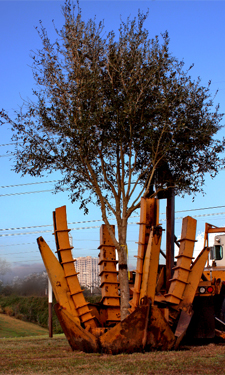 Sometimes, all it takes is a little common ground to spark a powerful connection. And for the Houston Parks and Recreation Department (HPARD) and the Apache Corporation, that common ground is trees.
Sometimes, all it takes is a little common ground to spark a powerful connection. And for the Houston Parks and Recreation Department (HPARD) and the Apache Corporation, that common ground is trees.
“Their goal is to plant trees. Our goal is to plant trees. It’s a perfect relationship,” says HPARD Director Joe Turner. He adds with a laugh, “I don’t really have a tree budget. I just write in the word ‘Apache.’”
Over the past eight years, the Houston-based oil and natural gas producer has donated an estimated 130,000 trees to HPARD through the Apache Corporation Tree Grant Program, a foundation-based initiative that seeks to improve wildlife habitats, restore storm damage and enhance cities and neighborhoods in Apache-active states. After a small donation to HPARD in 2006, the partnership grew, and today, 20,000 Apache trees are planted annually in Houston’s park system.
“They are one of our biggest partnerships, and we’ve been able to do some amazing projects,” Turner affirms.
As vice president of governmental, regulatory and community affairs for Apache, Obie O’Brien is responsible for day-to-day oversight of the grant program, which he launched in 2005. According to O’Brien, the program began like many others — with passion and an idea.
“Our founder, Raymond Plank, was a tree nut,” says O’Brien. “It was something that had been part of his upbringing. I think it was in 2004 or 2005 that he and I were talking, and he looked at me and said, ‘I’ve got a new job for you. I want to plant a million trees through the Apache Foundation.’”
And so they did. The 1-millionth tree was planted in 2009 outside Apache headquarters in Houston, and on Arbor Day in January 2013, the foundation saw its 3-millionth tree planted in Memorial Park. “We have plans to plant our 4-millionth, 5-millionth, and 6-millionth trees in the same place,” O’Brien adds.
HPARD notes Apache’s significant presence since 2008 in Houston’s Arbor Day celebrations, where each year, thousands of donated trees have been planted in various green spaces throughout the city. But the partnership would take on increased significance in 2011 when Texas suffered the worst drought in the state’s history and thousands of trees were lost in Houston’s parks — including an estimated 20,043 in Memorial Park.
In response to the disaster, HPARD embarked on a multiyear campaign, RE-Plant Houston, the goals of which are to raise money and rebuild Houston’s urban forests in conjunction with nonprofits, businesses, citizen groups and volunteers.
On Houston’s Arbor Day, January 26, 2012, upwards of 2,000 volunteers planted 25,000 trees in four city parks adversely affected by the drought. Apache donated 20,000 trees to the effort, which also included contributions from Trees for Houston, the Memorial Park Conservancy, the Hermann Park Conservancy, the Houston Parks Board and DRC Emergency Services.
Apache donated 2,000 five-gallon trees and two large oak trees to support similar activities on Arbor Day 2013, and for the past few years has helped raise hundreds of thousands of dollars for reforestation efforts by sponsoring two of the city’s annual sporting events, the Bayou City Classic Run for the Trees and Tour de Houston.
O’Brien says working with partners like HPARD makes sense, of course, because of the benefits municipal trees provide cities in terms of green space, shade, the amelioration of the heat-island effect and pollution control. But it’s also the understanding park agencies have of smart native-plant use, and their ability to maintain the trees long term, that make them a good fit.
He adds, “We know when we give the City of Houston Parks and Recreation Department trees, they’ll take care of them. And three or four years later when we go to look in on them, they’ll be there and thriving.”
Amy Kapp is a freelance writer in northern Virginia.

